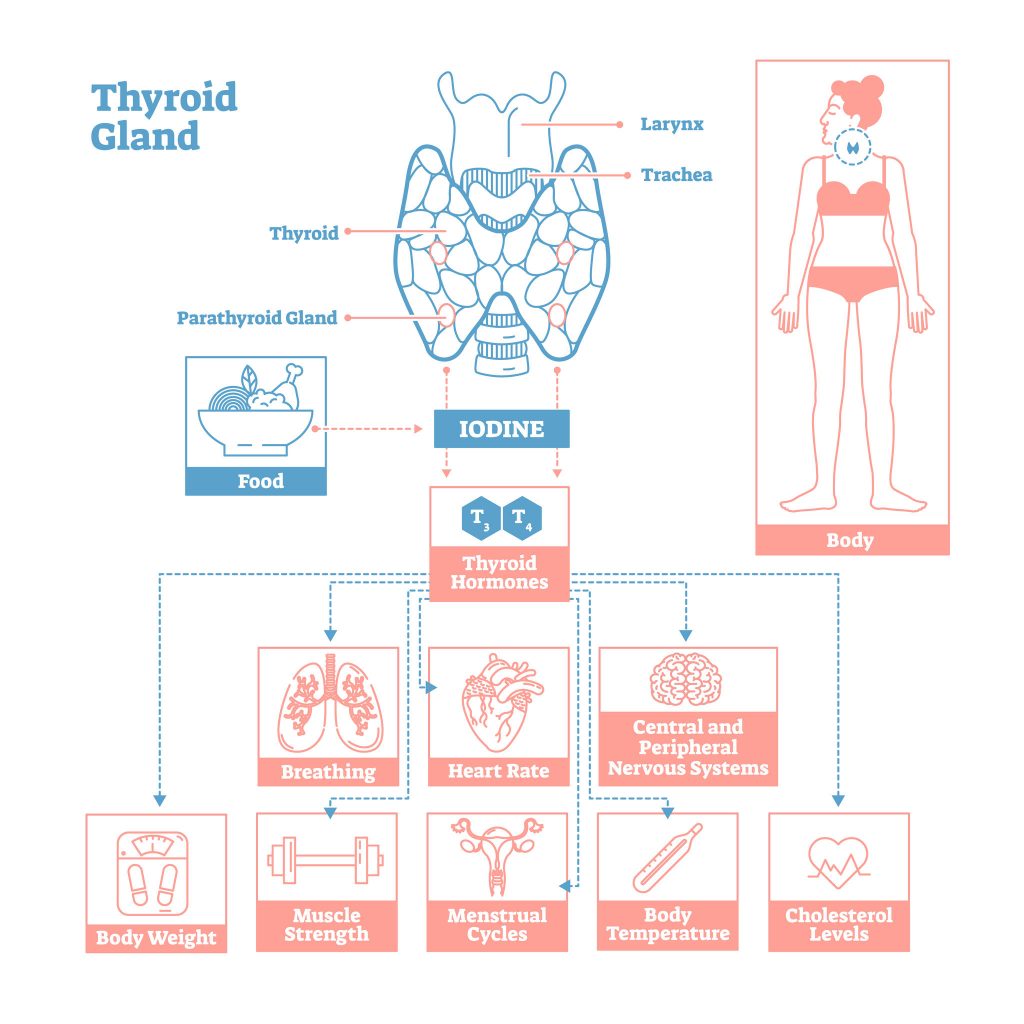Connection Between Your Thyroid and Weight – Problems Causing Weight Changes
Posted by Prescription Hope - See Editorial Guidelines (Last Updated On: Fri Jun 05 2020)
Are you someone that has had an unexplained change in your weight? If so, this could be a sign that you are having a thyroid issue. Problems with an individual’s thyroid may cause them to have unusual changes in their weight, whether it is weight gain or weight loss.
So, in this article, we will discuss the connection between your thyroid and weight. Here is a quick summary to get you started.
The Connection Between Your Thyroid and Weight: The thyroid is a gland that produces hormones responsible for regulating basal metabolism and different functions of the body. An overactive thyroid (hyperthyroidism) is a condition in which the body’s metabolism becomes accelerated, leading to potential weight loss. An underactive thyroid (hypothyroidism) is a condition in which the thyroid is not producing enough thyroid and leads to potential weight gain.
Now that you have a basic understanding, here is everything you need to know about the connection between your thyroid and weight.
Overview of Thyroid and Weight

It is no mystery that maintaining a healthy weight is important for individuals to live a life of quality. However, keeping one’s weight at a stable can be difficult for those that have an underlying condition causing weight gain or loss.
A problem with an individual’s thyroid may be the underlying condition causing unexplained weight changes.
The thyroid is a gland that sits at the front lower portion of the front. It is responsible for producing hormones that help regulate various functions of the human body. If the hormones being produced are thrown off, then the body’s functions can also be thrown off.
For example, if a person has an underactive thyroid, they may experience fatigue, tiredness, and other symptoms. This is due to the lack of hormones being produced by the thyroid.
Why Hypothyroidism Causes Weight Gain
Hypothyroidism has been correlated with individuals having a higher body mass index and a higher incidence of obesity. Though there appears to be a link between an underactive thyroid and weight gain that leads to obesity, the exact reasoning behind this is unclear.
However, one clear area is that hypothyroidism can cause minor weight gain.
One major responsibility of the thyroid gland is to regulate one’s metabolism. Your metabolism is essentially how the body breaks down food and uses it for energy. When it comes to an underactive thyroid, one’s metabolism slows down.
A slow metabolism can result in weight gain. The weight gain from hypothyroidism is typically only between 5-10 pounds. However, the more severe hypothyroidism one has, the more weight one may gain.
The weight that is gained from an underactive thyroid may be fat, but it is mostly from excess salt and water being accumulated.
So, as it has been made clear, unexplained weight gain is one symptom of hypothyroidism. Other symptoms of an underactive thyroid include:

- Fatigue
- Sensitivity to cold
- Dry skin
- Puffy face
- Muscle weakness
- Pain and stiffness in joints
- Impaired memory
- Depression
- Slowed heart rate
- Thinning of hair
- Enlarged thyroid gland
Tips for Managing Weight with Hypothyroidism
Achieving weight loss and meeting your goals can be difficult when you have hypothyroidism, but it is not impossible. Here are some tips to help you manage your weight if you have hypothyroidism.
Stop Eating Simple Carbohydrates
Foods that fall under the category of simple carbs include candy, soda, pastries, cereals, fruit juice, and any other food that has high amounts of added sugar. Individuals should strive to maintain a low-carb diet while still getting enough calories. Simple carbohydrate foods can cause an inflammatory response in your body, leading to the potential for more problems.
Eat Anti-Inflammatory Foods
Inflammation in the body can cause weight gain and can make it difficult to lose weight. Consuming a diet that is full of anti-inflammatory foods can significantly improve your health by easing joint pain, promote weight loss, as well as provide relief from depression. Foods that have an anti-inflammatory effect include green leafy vegetables, tomatoes, fatty fish, nuts, fruit, and olive oil.
Find Exercises That Fit You
We all know that exercising is a foundational piece for helping individuals lose weight and live healthier lives. However, certain exercises may not be right for some people. For example, some people may experience severe post-exercise pain or nausea. Others may easily have exercise-induced autoimmune flares that cause increased inflammation, which can cause increased setbacks. So, it is essential to find what exercises work for you and to perform them consistently.
Take Thyroid Medication
Medication needs to be prescribed in many cases to treat hypothyroidism. Individuals that start on thyroid medication are typically on it for the rest of their lives. The medication does not cure hypothyroidism, but it will keep it under control. Common hypothyroid medications include Synthroid, Levoxyl, and Tirosint.
Why Hyperthyroidism Causes Weight Loss
Individuals that have hyperthyroidism tend to have an elevated basal metabolic rate. The more severe that the hyperthyroid condition is, the more elevated the basal metabolic rate becomes. This means that more calories will be needed to maintain body weight. So, weight loss can become more severe in this case.
With weight loss being one symptom of hyperthyroidism, here are other symptoms to look for:
- Nervousness
- Trouble sleeping
- Hand tremors
- Mood swings
- Irregular heartbeat
- Increased frequency of bowel movements
Can an Overactive Thyroid Cause Weight Gain?
In some cases, individuals may experience some weight gain when they have hyperthyroidism. It is more common for patients to experience weight loss, but gaining weight is a possibility.
The reason for the weight gain may have to do with the person’s increased appetite. An increased appetite will often cause a person to increase their caloric intake. If they increase their caloric intake too much, then they may gain weight.
Antithyroid medications can be prescribed to reduce the amount of thyroid hormone being produced. This will help bring the body’s functions back into order. A common antithyroid drug may include propylthiouracil.
After treatment for hyperthyroidism is started, the individual may experience some weight gain. In some cases, patients may gain more weight than they originally lost. This is largely due to the person becoming used to the increased calories they were consuming during hyperthyroidism.
Conclusion
Many of those suffering from thyroid problems have had questions about their weight. We hope this has given you greater insight into problems with your thyroid and weight.
If you are struggling with affording your medications, then contact Prescription Hope. The team here works with the pharmaceutical companies to provide individuals with their medication at a set, affordable cost. Enroll with us and start saving money.

